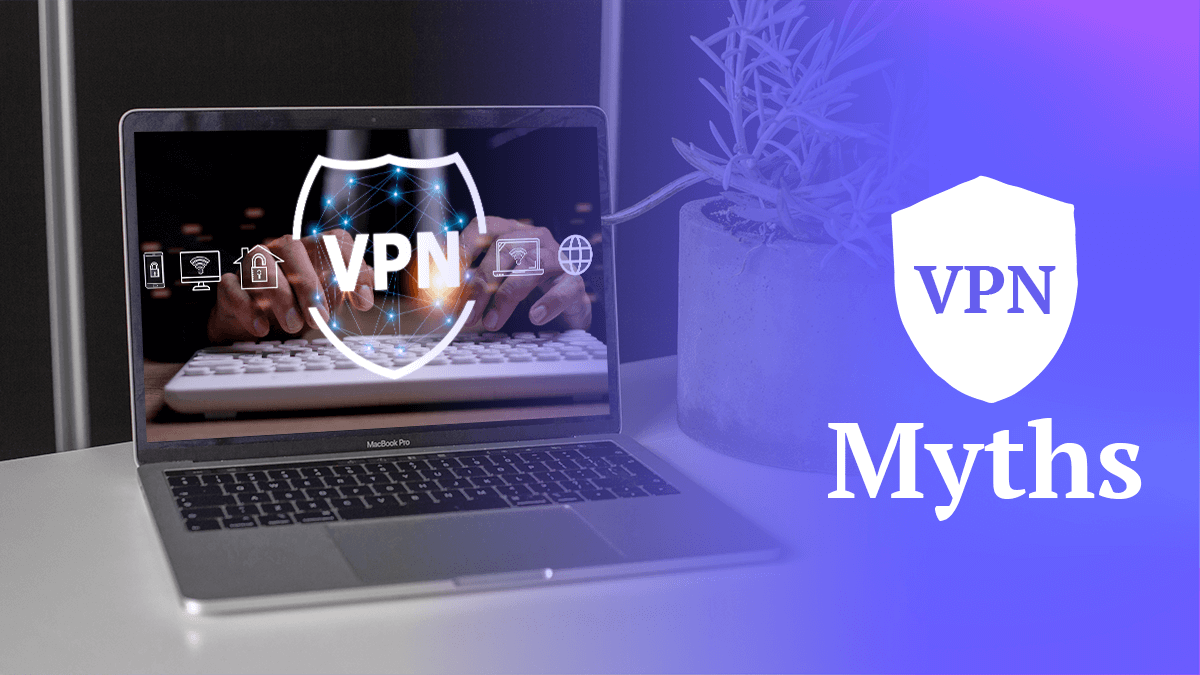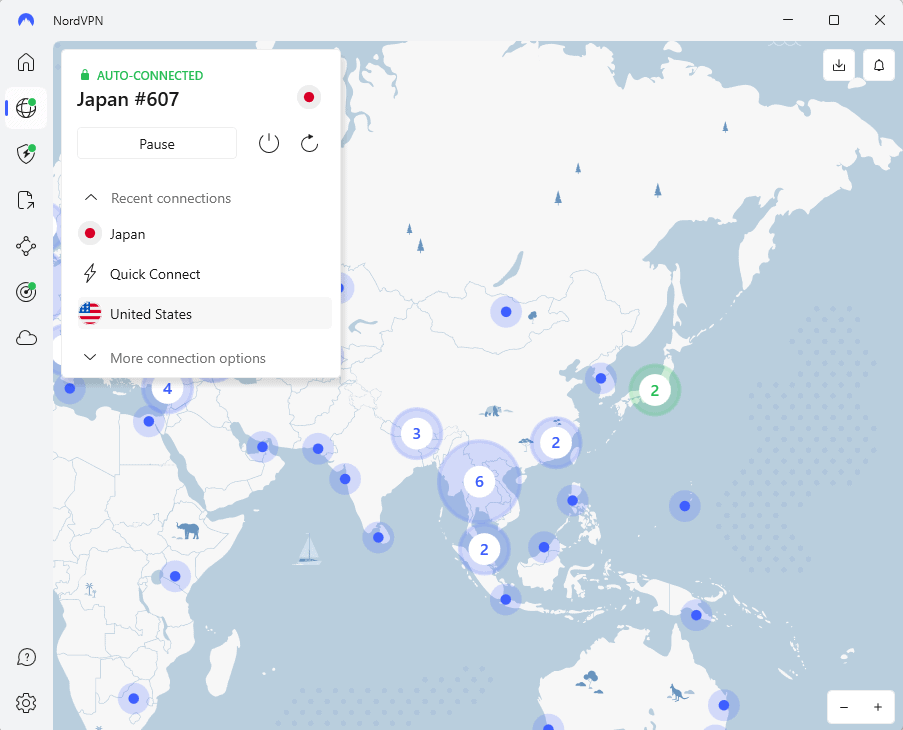
VPN Myths Debunked in 2025: 10 Misconceptions & Misunderstandings
- Table of Contents
- 10 Common VPN Myths
- Conclusion: VPN Myths
Quick Answer: VPN myths debunked
VPNs aren’t just for criminals or computer engineers; everyone can use a VPN to stay safe online. Although they don’t protect you from all forms of danger, VPNs encrypt your browsing so nobody can see the real you on the internet.
You can try my favorite, NordVPN, for free with a 30-day money-back guarantee.
VPN myths are a dime a dozen on the internet, thanks in no small part to the VPNs themselves. The marketers of your average virtual private network are happy to make claims ranging from half-truths (like HideMyAss having the largest server network) to outright lies (like No VPN logs your data).
- Best VPN services
In spite of VPN companies’ love of hyperbole, VPNs are a non-optional security measure if you want to live a safe, private life online. So today, I thought I’d debunk a few of the biggest VPN myths, so you can shop smarter for your security.
What are the disadvantages of a VPN?
The main disadvantage is that even when the VPN is active, the VPN provider can see your browsing activity. That’s why it’s so important to watch the news and see if the VPN sticks by its zero-logs policy when the chips are down.Is using a VPN suspicious?
Not at all. Over 40% of people on the internet use a VPN at least once a week. In a free society, there’s nothing suspicious about taking measures to protect your privacy, especially on public WiFi!
10 Common VPN Myths
Anyone remember Mythbusters?I used to love that show. If there was some way I could debunk these VPN myths with a laboratory full of crash test dummies and dynamite, I’d be all over it.
Unfortunately, for me — and fortunately for my neighbors — that won’t be necessary. You can separate the truth from the lies with just a little knowledge about what a VPN is and how it works. Here are the 10 most common VPN myths and the truth behind them.
Myth 1: VPNs Are Only for Criminals
The myth: Some law-abiding citizens wonder why they need to pay attention to their online privacy when they don’t have anything to hide.
The facts: There’s a near-infinite number of reasons for a law-abiding citizen to want privacy. We’ve got a whole amendment about it. Even in the 1780s, when impure thoughts were still punishable by the stocks, people recognized that privacy was — and is — a natural right.
VPNs aren’t for criminals any more than opaque front doors are. You don’t need to justify your privacy or anonymity to anyone.
Myth 2: VPNs Are Only for Technical People
The myth: Using a VPN may be important, but it’s such a complex piece of technology that nobody could use a VPN connection without a technical degree. It’s easier to just go without a VPN service and hope for the best.
The facts: There was a time when VPNs were a niche product, but that time is over. Today, over a hundred VPN services are clamoring for your attention, and the vast majority of them are grandparent-proof. In fact, most VPN providers you’ll see me recommend can be operated with one click.

Even the extra features on these VPNs are designed to be as easy to find and operate as possible. VPNs are officially mainstream, so user-friendliness is as much a priority as with any other software.
Myth 3: You Can Use Proxies Instead of a VPN
The myth: A proxy server is the same as a VPN, but free and easy to use. You can just paste your URL into the proxy website and get there in total safety.
The facts: Proxy servers, such as those offered in-browser by the likes of Hide.me, are a poor substitute for a VPN because they lack encryption. If you want online security, you need a VPN.
Both proxies and VPNs divert your connection through a secondary server to mask IP addresses, but only VPNs encrypt your internet traffic so snoops can’t gain information from spying on you. Learn more in the VPN vs tor vs proxy guide.
That information includes clues that would let them follow you back to your real IP address. Without encryption, hackers, advertisers, censors and other bad actors can trace your signal to its origin. Don’t use a proxy for personal internet security — only use a VPN.
Myth 4: Tor Can Substitute for a VPN
The myth: Tor Browser, an open-source program that runs your connection through a decentralized encryption network, is just as good as a VPN.
The facts: Tor does provide a similar level of security to a VPN, but it introduces a security flaw of its own. Tor works by randomly redirecting your connection through several relays, adding a new layer of encryption each time. Since the relays are run by volunteers instead of the Tor Project itself, there’s no central authority that can spy on your activities.
But there’s also no regulation of the volunteers who run the Tor relays. Controlling a relay gives attackers all sorts of chances to hijack your web traffic. The risk is so great that many websites have a blanket ban on access via Tor. That said, Tor is safe to use in parallel with a VPN, since the VPN protects you from malicious relays.
Myth 5: A VPN Makes You Impossible to Find Online
The myth: Once you boot up a VPN, you’re covered. You don’t have to make any more good choices to secure your identity and sensitive information on the internet.
The facts: When you get on a boat, they usually give you a life jacket. But that doesn’t mean you can fling yourself overboard whenever you feel like it.
A VPN is vital, but it’s no substitute for basic common sense. For one thing, it can’t protect you from IP address attacks if the attacker already knows your real IP address. This includes the DDoS attacks popular among sore losers in online games.
It also won’t protect your personal information if you choose to post it in public forums. If your home address is on your Facebook profile, a VPN won’t keep you from being doxxed.
A VPN also can’t keep you safe from social engineering scams. Phishing emails, catfishing and other common cybercrimes use old-fashioned con artist tricks to slip past your digital security. No matter what security you have running, you still need to make good decisions.
Myth 6: A VPN Can Boost Your Browsing Speed
The myth: The right VPN can improve your internet connection by accelerating your download and upload speeds and lowering your latency. (VPNs targeted at gamers love to trot this out.)
The facts: This one is complicated. A VPN can sometimes boost your speeds in a specific set of circumstances, but 99% of the time, it can’t get you above what you’d get without the VPN.
A VPN can boost your browsing speed if — and only if — you’ve been a victim of ISP throttling. ISPs clamp down on connection speeds for many reasons — and sometimes for no reason at all — but they can’t throttle your internet speed if they can’t find you.
To see if you’re being throttled, use speedtest.net to run two speed tests: one unprotected and one with a fast VPN like NordVPN. If the VPN is faster, your ISP is slowing you down, and a VPN may be able to help.
Myth 7: All VPNs Slow Down Your Browsing
The myth: The flip side of the previous myth. Any VPN you choose will slow your browsing speed to a crawl.
The facts: Again, it’s complicated. Typically, a VPN slows your browsing speed because it encrypts your traffic and sends it through another VPN server on the way to its destination. That takes time, like stopping by the grocery store on your way home from work.
But not all slowdowns are the same. How much internet speed you lose depends on several factors, including the quality of your VPN, the protocol you’re using and the physical distance from your selected VPN server. On a VPN server near you, with a fast protocol like IKEv2 or WireGuard, you may hardly notice a change during VPN usage.
Myth 8: Paid VPNs Are a Scam
The myth: There’s no reason to pay for a VPN service when there are free VPN options.
The facts: Look, free VPNs are great. It’s awesome that people are looking out for the privacy needs of VPN users who don’t have several dollars a month to spare. But if you can afford to pay for a VPN service, you should.
Premium VPNs aren’t scams, they’re businesses that need money to operate. In fact, the best free VPNs (like Windscribe, ProtonVPN and TunnelBear) are supported by premium plans. Fees allow the VPN provider to pay its staff and update the software to match the constantly evolving security landscape.
A free VPN often limits usage by imposing monthly data caps or only making certain servers available. The good news is there are plenty of ways to make a premium VPN more affordable. Save money by paying more in advance, watch for seasonal deals or take advantage of 30-day money-back guarantees.
Myth 9: No VPN Logs Your Data
The myth: Every VPN service provider has a privacy policy that says it doesn’t keep logs of its users’ identities or browsing histories. They can’t all be lying, right?
The facts: No, they can’t all be lying, but it pays to be cynical. It’s impossible to prove that a company isn’t doing something. Beyond that, if you read the whole privacy policy of most VPN services, you’ll often discover that “no-logs” VPNs collect and log quite a lot.
This includes some data for running the VPN, some for marketing it, some for troubleshooting, etc. Most of these purposes are benign, but many can be twisted toward privacy-violating ends.
However, there is a way you can hold a VPN accountable for its no-logs policy: check the news. VPN providers are occasionally put into situations where they have to back up their no-log policies. ExpressVPN passed the test when police confiscated one of its servers in Turkey and found nothing there. PureVPN and IPVanish didn’t fare so well.
Another example: With the government of India now demanding that VPNs make their data available, the best VPN services are choosing to remove servers within the country — option to use a remote server in a nearby country — instead of putting users’ sensitive data at risk.
Myth 10: It’s Bad for a VPN to Be Located in a Five Eyes Country
The myth: If a VPN is located in a signatory of the Five Eyes, Nine Eyes or Fourteen Eyes intelligence agreements, it’s not safe to use.
The facts: Five Eyes and its cousins are victims of bad branding. This is one of the rare cases where the name of an intelligence program is more sinister than the program itself. Don’t get me wrong, Five Eyes is not a good thing for the average citizen, but it doesn’t have anything to do with your VPN’s reliability.
The Five Eyes treaty formalized relationships between five longtime allies: the United States, the United Kingdom, Canada, Australia and New Zealand. If one of those countries gathers intelligence, it usually offers to share it with the other four. Yes, that often includes the governments spying on their own citizens without warrants, as revealed in the Snowden leak.
But being a member of Five Eyes doesn’t give a nation more power to seize VPN data than it would have had already. The VPNs that turned over user data, like PureVPN and IPVanish, faced the same pressure as ExpressVPN. They caved because they had the data to hand over, not because the governments demanding it were uniquely powerful.
The most important thing is whether the VPN keeps logs. If it doesn’t log user data, it can’t give that confidential data to anybody, no matter how many eyes they have.
Conclusion: VPN Myths
There are many misconceptions and myths surrounding VPNs. Even with the best VPN services like NordVPN and ExpressVPN on your side, critical thinking is your most powerful weapon to stay secure.
Have you ever fallen for a VPN myth? Is there one that frustrates you more than any other? What tools do you use to maintain online anonymity? Let me know in the comments, and thanks for reading!

Leave a Reply